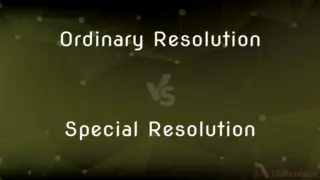Server vs. Waiter — What's the Difference?
Edited by Tayyaba Rehman — By Fiza Rafique — Published on December 18, 2023
A Server can refer to both a computer device that manages network resources or a person who serves food, while a Waiter specifically means a male individual serving food in a restaurant.

Difference Between Server and Waiter
Table of Contents
ADVERTISEMENT
Key Differences
In the realm of technology, a Server is a dedicated computer or software system designed to manage network resources and respond to requests from client computers. On the other hand, in hospitality, a Waiter is a male individual whose primary role is to serve customers by taking orders and bringing food to the table.
In the United States, the term "Server" has gained preference in the restaurant industry to maintain gender neutrality, encompassing both male and female staff. Conversely, the term "Waiter" is gender-specific, traditionally referring to males, with "Waitress" being its female counterpart.
Moreover, the functionality of a Server in a computer context is vastly different from that of a Waiter. A Server processes data, manages resources, and facilitates communication between computers, whereas a Waiter interacts directly with customers, ensuring they have a pleasant dining experience.
The etymology of both words also diverges. While "Server" stems from the act of serving, either data or food, "Waiter" comes from the act of waiting or attending to someone. Hence, a Server serves, and a Waiter waits upon customers.
Comparison Chart
Primary Meaning
A computer or person that serves
Specifically, a male individual serving food
ADVERTISEMENT
Gender Association
Neutral
Male (with "Waitress" for females)
Functionality
Manages network resources or serves food/drink
Serves food and attends to customers in restaurants
Industry Usage
Common in both IT and hospitality
Predominantly in hospitality
Origin
Pertains to the act of serving
Relates to waiting or attending to someone
Compare with Definitions
Server
An individual in a restaurant who serves food and beverages.
The Server recommended the chef's special for the day.
Waiter
A male individual who serves food and drinks in a restaurant.
The Waiter brought our meals promptly.
Server
A utensil used to dish out or serve food.
She used a cake Server to slice and serve the dessert.
Waiter
A person who waits or is waiting.
He was a patient Waiter, standing in line for hours.
Server
One who serves or performs a particular function.
He acted as a Server during the tennis match.
Waiter
A tray or salver on which dishes or glasses are carried.
He placed the drinks on the Waiter and carried them to the table.
Server
One who serves food and drink. See Usage Note at waiter.
Waiter
One who serves at a table, as in a restaurant.
Server
Something, such as a tray, that is used in serving food and drink.
Waiter
A tray or salver.
Server
An altar server.
Waiter
A male or female attendant who serves customers at their tables in a restaurant, café or similar.
Waiter! There's a fly in my soup.
Server
(Law) One who serves a legal process, such as a summons or court order.
Waiter
Someone who waits for somebody or something; a person who is waiting.
Server
(Sports) The player who serves, as in court games.
Waiter
(historical) A person working as an attendant at the London Stock Exchange.
Server
A file server.
Waiter
(obsolete) A vessel or tray on which something is carried, as dishes, etc.; a salver. (See etymology of dumbwaiter.)
Server
A computer that processes requests for HTML and other documents that are components of webpages.
Waiter
(obsolete) A custom house officer; a tide waiter.
Server
(computing) A program that provides services to other programs or devices, either in the same computer or over a computer network.
Waiter
(obsolete) A watchman.
Server
(computing) A computer dedicated to running such programs.
Waiter
(stative) To work as a waiter.
Server
One who serves.
Waiter
One who, or that which, waits; an attendant; a servant in attendance, esp. at table.
The waiters stand in ranks; the yeomen cry,"Make room," as if a duke were passing by.
Server
A waitress or waiter.
Waiter
A vessel or tray on which something is carried, as dishes, etc.; a salver.
Server
The player who serves the ball.
Waiter
A person whose occupation is to serve at table (as in a restaurant)
Server
(Christianity) A priest's attendant at the celebration of the Eucharist.
Waiter
A person who waits or awaits
Server
A tray for dishes.
Waiter
A person who attends to the needs of customers in a dining establishment.
The Waiter was attentive and made sure our glasses were always full.
Server
A spoon for serving food.
Waiter
An attendant in a railway car or similar.
The Waiter on the luxury train offered us beverages.
Server
One who serves.
Server
A tray for dishes; a salver.
Server
A person whose occupation is to serve at table (as in a restaurant)
Server
(court games) the player who serves to start a point
Server
(computer science) a computer that provides client stations with access to files and printers as shared resources to a computer network
Server
Utensil used in serving food or drink
Server
A computer system that manages and distributes network resources.
The company invested in a new Server to improve its website speed.
Server
A software system that processes and responds to client requests.
The email Server was down, causing delays in communication.
Common Curiosities
Is "Waiter" gender-neutral?
No, "Waiter" specifically refers to males, with "Waitress" denoting females.
Is "Waitress" the female version of "Waiter"?
Yes, "Waitress" is the term for a female individual serving food in a restaurant.
Why is "Server" used more commonly in restaurants now?
"Server" is gender-neutral, making it more inclusive and preferred in the hospitality industry.
Is a Waiter's role only limited to serving food?
No, Waiters also take orders, provide suggestions, and ensure a pleasant dining experience.
Can "Waiter" be used to describe someone simply waiting?
Yes, in some contexts, "Waiter" can mean a person who is waiting.
Which word, Server or Waiter, has a broader range of meanings?
"Server" has a broader range, as it can refer to both machines and individuals in various contexts.
Can the term Server refer to both a machine and a person?
Yes, a Server can mean a computer managing network resources or a person serving food.
Can "Server" mean a type of utensil?
Yes, a Server can also be a utensil used to serve food.
Do computer Servers always refer to physical machines?
No, Servers can be physical machines or software systems.
Are the terms "Server" and "Waiter" interchangeable in a dining context?
In many cases, yes, but "Waiter" is gender-specific while "Server" is not.
Do both "Server" and "Waiter" originate from the act of serving?
"Server" does, while "Waiter" originates from the act of waiting or attending to someone.
Which term, "Server" or "Waiter," is more encompassing in the restaurant industry?
"Server" is more encompassing as it is gender-neutral and can refer to anyone serving food.
Do all restaurants use the term "Server"?
While many do for gender neutrality, some still use "Waiter" and "Waitress."
Can a Waiter work in places other than restaurants?
Yes, Waiters can also work in settings like trains, planes, or events.
Is the primary job of a computer Server to manage network resources?
Yes, a computer Server manages and distributes network resources.
Share Your Discovery

Previous Comparison
Ordinary Resolution vs. Special Resolution
Next Comparison
DHTML vs. XMLAuthor Spotlight
Written by
Fiza RafiqueFiza Rafique is a skilled content writer at AskDifference.com, where she meticulously refines and enhances written pieces. Drawing from her vast editorial expertise, Fiza ensures clarity, accuracy, and precision in every article. Passionate about language, she continually seeks to elevate the quality of content for readers worldwide.
Edited by
Tayyaba RehmanTayyaba Rehman is a distinguished writer, currently serving as a primary contributor to askdifference.com. As a researcher in semantics and etymology, Tayyaba's passion for the complexity of languages and their distinctions has found a perfect home on the platform. Tayyaba delves into the intricacies of language, distinguishing between commonly confused words and phrases, thereby providing clarity for readers worldwide.














































